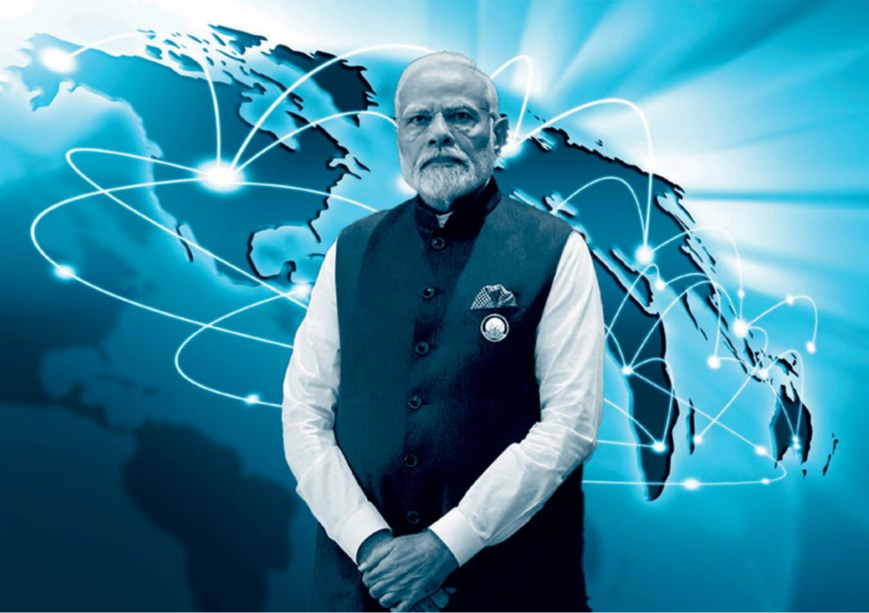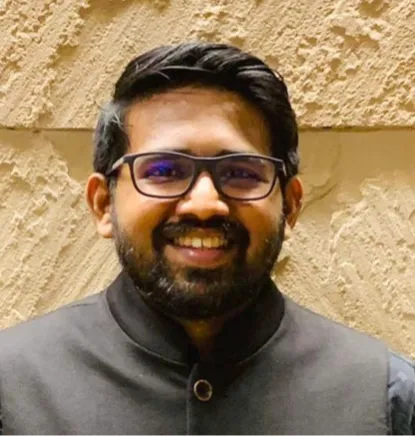-
CENTRES
Progammes & Centres
Location
A survey finds overwhelming support for Modi’s foreign policy among Indian youth

Image Source: Illustration: Saurabh Singh
Through the last five years, India has managed to maintain its sway and place in the new world order despite challenges, such as the onset of the Covid-19 pandemic, the Russia-Ukraine war, and increasing Chinese aggression and border intrusions. As India—the world’s largest democracy—heads to elections this year, it is important to capture an all-encompassing public opinion of Indian youth on foreign policy. The third iteration of the Observer Research Foundation’s (ORF) Foreign Policy Survey intends to cover this gap. The survey is an annual initiative that captures how Indian youth, comprising 60 per cent of the country’s population, perceive and think of India’s foreign policy. The survey was conducted among 5,000 Indians between 18 and 35 years in 19 different cities and 11 languages from August 7 to September 15, 2023.
The 2023 survey indicates strong public support for the government’s foreign policy (83 per cent). The positive perception is likely due to India’s successful G20 presidency and public diplomacy. Eighty-three per cent of respondents believed that India’s G20 presidency has been successful compared to the 2022 survey where 74 per cent were in fact unaware of the grouping. India’s deft handling of G20 seems to have also revived some faith in multilateralism. For instance, when asked about issues that India’s G20 presidency prioritised and issues that multilateral organisations should prioritise in the post-pandemic world, healthcare and food security were the top responses. The young also aspire for India to be part of exclusive platforms. They advocated for a permanent membership at the United Nations Security Council (UNSC) (88 per cent) and a permanent invitee status at the G7 summit (83 per cent).
While more than half of the respondents have advocated for better economic relations with China, India’s urban youth see that country as a significant challenge to India. The Galwan clashes of 2020 have severely depleted their trust (80 per cent) in China. Border conflict with China was seen as a significant challenge by 84 per cent; threats related to China like global pandemics (90 per cent), economic slowdown (86 per cent), and cyber security (85 per cent) were recorded as some of India’s biggest challenges. Eighty-six per cent of the youth have expressed concerns about Chinese debt trapping and salami slicing in India’s neighbourhood, and 77 per cent agreed that Chinese encroachments and disputes are a development and security concern for India. Given that China’s aggression and assertiveness have increased in the last few years, only 29 per cent are satisfied with the current state of the relationship, and a mere 34 per cent believe that China will likely be India’s partner in future.
Indian youth appear to understand India’s strategic shift and see China as a prominent and emerging threat when compared to Pakistan. Eighty per cent of respondents agreed that border conflict with Pakistan is a significant challenge, which is a 2 percentage point reduction from the 2022 survey. Other challenges from Pakistan like terrorism (88 per cent) are deemed a significant concern for India too. As a result, 81 per cent expressed distrust, and 74 per cent deemed relations to be poor with Pakistan. Only 17 per cent stated that relations improved in the last five years. Sixty one per cent of respondents even opposed any kind of assistance to Pakistan at the time of its economic crisis. Concerns about terrorism have also contributed to an increase in negative perceptions of Afghanistan. Distrust for the country has increased from 31 per cent in 2021 to 56 per cent in 2023, and the proportion of respondents with negative perceptions about the current state of relations has increased from 23 per cent in 2021 to 45 per cent in 2023.
The young are optimistic about India’s relations with other neighbours. Nepal has retained the position of most-trusted neighbour for the second consecutive year (72 per cent), closely followed by Thailand and Bhutan (63 per cent). Sixty-seven per cent of urban youth consider India’s relationship with Nepal good, and 62 per cent feel that the relationship has improved in the last five years. Urban youth believe India’s development cooperation with neighbours has been adequate (83 per cent), and support India’s assistance to Sri Lanka (80 per cent), Nepal (76 per cent), and Bangladesh (56 per cent) at times of economic difficulties. The push for robust connectivity under Prime Minister Modi’s Neighbourhood First policy is also well received. Respondents believe that India’s efforts in connectivity are adequate across all sectors (76-86 per cent), with technology and people-to-people and transport connectivity sectors taking the lead. Seventy one per cent of respondents also agreed that India should relax the list of restricted commodities on its Free Trade Agreements (FTAs) while trading with its neighbours.
The year 2023 has been crucial and India’s urban youth seems to be standing solidly behind the Modi government’s foreign policy agenda, underscoring a rare convergence between societal aspirations and state response
Growing India-US relations are contributing to an optimistic perception of the US. Eighty one per cent of respondents are satisfied with the current state of relations with the US, and the same percentage sees the country as India’s top preferred partner. Increasing Chinese aggression and assertiveness have also boosted positive perceptions of the US. A significant majority agreed that India and the US should cooperate as tensions with China escalate; they advocated strengthening the Quadrilateral Security Dialogue (Quad), and technology and information sharing to deter Chinese aggressions. Compared to 2022, there is a 3 percentage point increase in respondents preferring cooperation with the US (44 per cent) as tensions between the US and China worsen, and a 6 percentage point increase in India and the US strengthening the Quad.
Russia—India’s traditional partner—continues to enjoy a positive opinion among young Indians. Seventy seven per cent of respondents are satisfied with the current state of relations, and the same percentage of respondents has registered Russia as a preferred partner in future. In essence, Russia is seen as India’s second-most preferred partner. Respondents have also indicated support for India’s strategic autonomy and balancing; nearly 80 per cent of them agree that India should remain neutral during the Russia-Ukraine war, and 51 per cent believe that India should remain neutral as tensions between the West and Russia escalate. However, concerns persist about the future of India-Russia relations. Eighty-two per cent opined that India should diversify its defence relations. Nearly 75 per cent are concerned about diverging partnerships between India and Russia and the growing closeness between Russia and China. Concerns about the growing proximity between Moscow and Beijing have increased by 8 percentage points.
The other Quad partners—Australia and Japan—are not far behind Russia. Seventy-six per cent were satisfied with the current state of relations with Australia, and 77 per cent of them saw Australia as India’s leading partner in future. On Japan, 75 per cent are satisfied with the state of bilateral relations, and 76 per cent see the country as India’s reliable partner in future. It is with this trust for Quad partners, that the Quad itself has been very popular among young Indians. The Quad was the most preferred organisation (74 per cent) for promoting India’s interests. This is followed by initiatives like India-France-Australia, India-Indonesia-Australia, India-Italy-Japan, and India-Israel-US-UAE, where India is cooperating with fellow Quad partners.
India’s increasing economic growth and partnerships, and the need for resilient supply chains have likely motivated the majority of Indian youth to be pro-trade. Respondents are most optimistic about India’s economic engagements with North America (73 per cent), Europe (69 per cent), and Central Asia (66 per cent). Nearly 75 per cent of respondents believed that FTAs increase job opportunities and standards of living, and 73 per cent agreed that FTAs with the European Union (EU) and the UK will be beneficial for India. Seventy one per cent of respondents further agreed that FTAs help supplement India’s quest for self-reliance and strengthen multilateral organisations. Nearly 72 per cent of respondents also agreed that G7’s de-risking strategy will be beneficial to India when compared to their decoupling strategy.
The year 2023 has been crucial for India. The country has exceptionally managed its G20 presidency, navigated new strategic challenges, and positioned itself as a major player in the new world order. With a population that is significantly young, it is important to understand how youth look and perceive India’s foreign policy. India’s urban youth seems to be standing solidly behind the Modi government’s foreign policy agenda, underscoring a rare convergence between societal aspirations and state response.
This commentary originally appeared in Open.
The views expressed above belong to the author(s). ORF research and analyses now available on Telegram! Click here to access our curated content — blogs, longforms and interviews.

Professor Harsh V. Pant is Vice President – Studies and Foreign Policy at Observer Research Foundation, New Delhi. He is a Professor of International Relations ...
Read More +
Aditya Gowdara Shivamurthy is an Associate Fellow with the Strategic Studies Programme’s Neighbourhood Studies Initiative. He focuses on strategic and security-related developments in the South Asian ...
Read More +